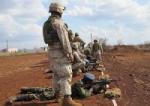Gunmen yesterday detonated a powerful explosive at a primary school in Maiduguri, causing a fire that razed classrooms and the headmaster’s office.
The dawn attack on Gomari Costain Primary School was the fourth such raid suspected to be launched by Boko Haram over the past week, forcing four primary schools in the city to shut down.
The three other primary schools earlier burnt and shut down were those in Kulagumna, Budum and Abbaganaram.
At least 5,000 school children have been forced to stay at home because of the incidents, according to estimates by teachers in the affected schools.
Each of the four attacks was staged at night when the schools were closed, and so no pupil or teacher was killed.
In yesterday’s attack at Gomari, resident Sani Salisu said he heard a “deafening and frightening sound” around 5.45am, shortly after the morning Muslim prayers.
“There is dusk-to-dawn curfew in Maiduguri and therefore must of us did not go to the mosque for the morning prayers. The sound of the blast was followed by gunshots. It was in the morning that we realized that the blast was at the primary school,” Salisu said.
The New Agency of Nigeria (NAN) reported that some teachers of the school said a group of persons, mainly teenagers, drove away the security guard before setting the school ablaze.
One of the teachers, who lives near the school premises, said, “We heard a loud noise in the school at night and we thought it was a minor thing but when we reported for duty in the morning we discovered that fire had burnt the school. When we asked the security guard on duty he told us what happened.”
Another resident who did not want his name in print said he saw the dead body of an unidentified man around 7am yesterday near the blast scene.
“The copse was lying on ground about 200 metres away from the scene of the blast. I also saw another man with gunshot injuries being taken away,” he said.
Spokesman for the Borno State police command Samuel Tizhe confirmed that there was an attack at a primary school in the early hours of yesterday.
“We are, however, investigating circumstances that prompted the attacks on primary schools. Most of the schools affected by the assault were renovated recently,” he said.
Boko Haram, whose name means ‘Western education is prohibited’, has targeted mainly security formations since they launched their campaign of violence nearly two years ago.
In the attack on Kulagumna Primary School 10 days ago, two blocks of classrooms and the headmaster’s office were destroyed.
At Abbaganaram school, 20 classes, five offices and some stores where destroyed, while at Budum, four classrooms and a store filled with books and instructional materials were destroyed.
The new trend of attacks on primary schools has forced many parents to withdraw their children and wards from schools for fear of their safety, teacher Fanta Kaka Modu told Daily Trust.
“For now, at least 5,000 pupils in the four primary schools that have been burnt down must remain at home,” she said.
But officials of the State Universal Primary Education Board (SUBEB) are yet to give details of the impact of the attacks.
No one claimed responsibility for yesterday’s strike, but Boko Haram said they executed the earlier attack on the three primary schools.
In a teleconference with journalists in Maiduguri on Sunday, Boko Haram spokesman Abul Qaqa said the sect attacked the three schools because security men had been raiding Islamic schools in Maiduguri recently.
“We attacked the schools because security operatives are going to Islamiyya schools and picking teachers. We are attacking the public schools at night because we don’t want to kill innocent pupils. Unless (Islamic schools) teachers are allowed to be, we would be compelled to continue attacking schools,” Qaqa said.















Bookmarks